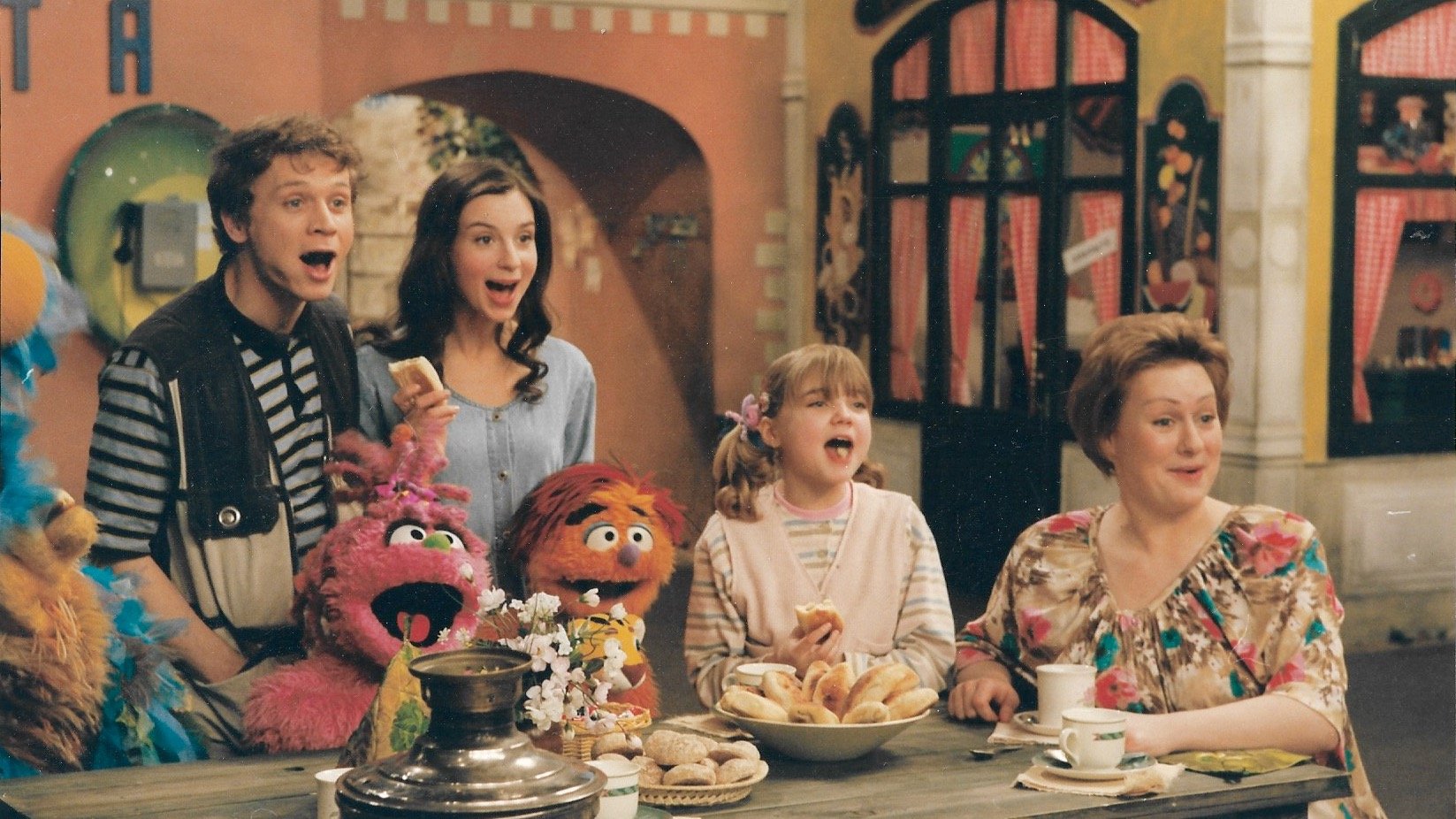Liberian reporters covering Ebola up close get boost from On the Media

FrontPage Africa reporter Mae Azango (left) and On the Media producer Meara Sharma (center) talking with security officer Edwin G.V. Kane and beach workers in Liberia. (Photo: Brooke Gladstone)
A story about reporters in Liberia risking their lives to cover the Ebola outbreak prompted a visit from a public radio show and unexpected help from an inspired listener.
When Rachel Mercy Simpson heard the story on WNYC’s On the Media in October, she immediately thought about a $5,000 inheritance from a deceased uncle that she had stashed away.
Mercy Simpson was listening when co-host Brooke Gladstone interviewed Rodney Sieh, editor of FrontPage Africa, a newspaper based in Monrovia, Liberia.
“We don’t have the resources that other people have,” Sieh told Gladstone during the segment. “Our reporters can’t afford to get protective gear, so we have to improvise at times.”
As someone who works in media — Mercy Simpson is department chair of multimedia arts at Berkeley City College — she was especially moved.
“I found it both heartbreaking and inspiring that the reporters were putting their life on the line to get the story out,” said Mercy Simpson.
Because of her background, Mercy Simpson also had connections and knew about equipment, so she could get Sieh and his reporters what they needed to safely cover the story. The extra cash helped, too.
But when she visited FrontPage Africa’s website to look for a donate button, there was none. She emailed Sieh directly asking what they needed. Telephoto camera lenses and Personal Protective Equipment suits, he said.
With the money she was able to buy over 100 PPE suits, eight telephoto lenses and two DSLR cameras.
The hard part was getting the equipment from Berkeley to Monrovia. Sending thousands of dollars worth of equipment through the mail would be risky, slow and expensive.
So she emailed friends and family seeking assistance with transporting the equipment, and the next thing she knew, “it became this international kind of effort,” she said. Media organizations traveling to the region volunteered to help, and airlines lifted their baggage restrictions.
The Washington Post’s Michel duCille, who died of an apparent heart attack Dec. 11 while on assignment in Liberia, and Lenny Bernstein helped transport the cameras. The BBC found two doctors from Pennsylvania traveling to the region, and United Airlines allowed them to take 12 bags filled with the suits.
In addition to the equipment Mercy Simpson purchased, the Post donated six Dell computers.
“That’s the best $5,000 I’ve ever spent,” said Mercy Simpson.

Rachel Mercy Simpson and her son pose with a box of PPE suits before they are sent to FrontPage Africa. (Photo: Rachel Mercy Simpson)
Mercy Simpson wasn’t the only one moved by FrontPage Africa’s story. The staff of On the Media felt that the newspaper’s efforts deserved more coverage, so they decided to do something unusual for the show: on-the-ground reporting.
“We knew that Liberia was being reported through an extremely American lens,” said Gladstone. “It was only Ebola. Ebola was reported on, I think one can agree, reflexively hysterically in this country.”
“It struck us that not only was Liberia seen as nothing but a vector, but there was much to be learned about how Liberians were living their lives and conducting their politics and essentially reporting on themselves in the midst of the limitations imposed by this disease.”
Gladstone and OTM producer Meara Sharma spent a week this month shadowing FrontPage Africa reporters — a rare instance in which Gladstone transitioned from media commentator to on-the-ground reporter. An hourlong episode of stories from Liberia aired Dec. 12. The show took three weeks to produce and was partially financed by a grant from the Ford Foundation.
And yes, FrontPage Africa is putting Mercy Simpson’s equipment to good use.
“They were using [it] with a quarantined family that we spoke to,” Gladstone said. “I was using a boom mic to keep me four feet between me and the family, and the reporter was using the telephoto lens.”
Gladstone and Sharma are now back in the U.S. And while Gladstone said she felt safe during her reporting, she does get a call every day from the New York Department of Health asking for her temperature and if she feels certain symptoms. The calls will continue until three weeks after her return.
“It’s all very pleasant and in no way infringes on my ability to continue working,” said Gladstone.
On the Media has traveled to places like China, Russia and Egypt to produce shows in the past. But Gladstone can think of only about six times when the show has done similar reporting during her 14 years as co-host. The show has a small team, and reporting on the ground requires money and time.
“[For] all of these [reported stories], we had determined that we couldn’t do a proper job at such a distance — we had to be in the space to convey what was going on,” said Gladstone. “First of all, to understand it, and then convey it in the kind of depth that we want to do at On the Media, that we try to do every week.”
“What this piece was supposed to do wasn’t so much to report the story, but to give you a hint of what it’s like to live there, just a hint,” she added. “The best that parachute journalists can do, which is, by definition, limited. Just to give you a sense of a whole nation, a complex people, not just a place on a map with the word ‘Ebola’ written across it in red.”
Related stories from Current:







[…] Read Tyler Falk, http://www.current.org […]